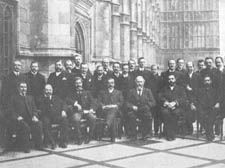
The Parliamentary Labour Party on the terrace of the House of Commons, February 1906 |
The pioneers who put the new into Labour
The original members of the Labour Party in Parliament would have found themselves quite at home in Blair’s party, writes Illtyd Harrington
Men Who Made Labour
Edited by Alan Haworth
and Dianne Hayter Routledge, £30 order this book
DIGGING up the dead, dissecting them, and passing them through to the embalmer who must make them acceptable to the curious is a difficult, often grisly task.
Diana Hayter, the lively Blairite from Kentish Town, and Lord Alan Haworth, former secretary of the Parliamentary Labour Party have assembled potted biographies of the 29 men who formed the original Labour Party in Parliament.
It was in February 100 years ago and the present incumbents of their seats have written accounts of their lives, ideas, and significance.
Most were working class with little schooling and all experienced harsh child labour in mills, mines and factories. A group of men with unformulated ideas to make life fairer were afraid of being tarred by the brush of extremism or the stigma of Marxism, as well as being nervous of straying too far from the Liberals.
Tony Blair in his introduction says: “Not a lot of them call themselves socialists.” A correct observation and socialism is a word rarely used by the 29 characters.
The then Prince of Wales hoped that “not all were socialists”. Another of the 29 writes that the word socialist could be “problematic.” This still seems to be the view within New Labour.
As far back as 1903, Labour did a deal with the Liberals on Parliamentary contests. Very quickly many of these honey-handed sons of toil began to resemble Edwardian suburban pillars of society; against drink and sex and happily worshipping a God who kept strict moral accounts – like a bank manager.
Without pay or allowances, most depended on trade unions for financial support.
Still they achieved some targets. George Barnes helped establish the International Labour Organisation within the League of Nations – a great step for workers’ recognition. Others advocated free school meals, better housing and workers’ rights.
George Bowman the MP for Deptford, we are told, had five sons and seven daughters. A jingoist from 1914-8 and demonstrably very much a family man.
JR Clynes became Home Secretary to Lloyd George and opposed the cutting of soldiers’ beer rations and was against capital punishment.
Will Crooks for Woolwich, the original home of Arsenal Football Club, was another supporter of war and was the last survivor of the group, dying in 1946.
Charles Duncan, who ended up as the absentee representative for Clay Cross, is remembered mainly as a “dandy and snappy” dresser.
The Labour Party’s saint James Keir Hardie was a self-centred egotist.
Arthur Henderson was the first Labour foreign secretary and won the Nobel Peace Prize and, as Secretary of the Labour Party, vigorously and ruthlessly kept the Left at bay.
King George V, after initial nervous doubts, flattered some. A night’s board and lodging in Windsor Castle moved John Hodge of Gorton, Manchester, to emotional tremors worthy of a debutant being presented at court.
There are two whose infamy remains, but who are part of the current rehabilitation process.
Namely Ramsay MacDonald, the first Labour Prime Minister, and Philip Snowdon the Chancellor of the Exchequer. Their answer to the 1931 crisis was to cut public expenditure by £97 million, £67 million of which was from unemployment benefits.
MacDonald unilaterally formed a government with the Tories. He crowed: “Every duchess in Mayfair will want to kiss me after this.”
Patricia Hewitt writes a hymn of praise to MacDonald, her forebear in Leicester. It is an apologia worthy of a leader writer in Stalin’s Pravda.
Jack Straw, who stubbornly persists in his own inadequacy, lauds Snowdon – these two, cosy in Blair’s entourage, ask for little more than understanding – they fail to persuade that such betrayal was a necessary step on the way to Blair’s three governments.
The ludicrous gullibility of others is exemplified in the piece on James O’Grady, a xenophobic Roman Catholic who was rewarded by being made governor of Tasmania and leader of the Falklands. Hardly strenuous, and, I almost forgot to say, he wore spats over his shoes.
David Shackleton, the first Labour MP, became the permanent secretary of the freshly created Ministry of Labour in 1916.
Sir David, as he became, seems a joyless man who enjoyed his retirement in the Independent Order of Rechabites – an austere temperence group.
Our two editors and most of the contributors belong to the school of thought that places the Labour party at the logical evolution of old Liberalism.
I am reluctant to point out that none of the 29 would have condoned the grand larceny of the Labour Party by Blair. Clause 4 abolished in a paragraph, the chairman of the Labour Party appointed by Blair. Nicky Gavron, who was chosen by the London membership as their mayoral candidate, was replaced with Ken Livingstone on the orders of number 10.
The pioneers have led us to non-participation, slumped individual members and the imposition of personalities over candidates and ideas and an indifference to Parliamentary procedure.
Our entry into the shining city of Jerusalem has been postponed once again.
|








